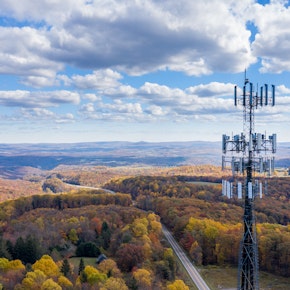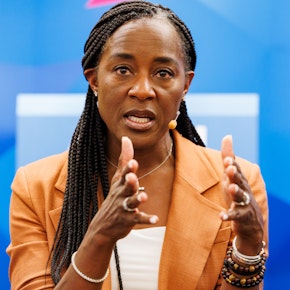Explore
Search results

Race, ethnicity, age, sex, environment, and other social determinants of health can all impact how different people respond to the same medicine or vaccine. This is why diversity and inclusivity at every stage of the medical research process are critical to learning about the safety and efficacy of potential treatments for all patients. Presented by Pfizer.

The innovative philanthropist who paid off the student debt of the entire graduating class of Morehouse College class of 2019 talks about how to ensure all communities benefit from the digital revolution.


An entire generation of children in some of the world’s poorest countries are now protected against deadly infectious diseases, thanks largely to Gavi: The Vaccine Alliance. Impact: more than 16 million lives saved, vast healthcare cost savings, and greater global health security. A leading force behind the push for equitable access to COVID-19 vaccines, Gavi has played a...

The pandemic has exposed long standing inequity when it comes to access and adoption of critical technologies, from broadband connections to laptops to digital literacy. These are the necessary conditions for children to learn, for young adults to acquire needed skills, for adults to find jobs, and to ensure everyone has access to the services they need. In this conversati...

Hospitals and health systems have a critical role to play in turning health equity talk into action. Learn how the field is using strategic investments to drive innovative solutions forward. Presented by the American Hospital Association.

One positive thing about COVID-19 is that it has forced us to reckon with significant structural weaknesses across our economy that touch most Americans. Small businesses — many run by people of color — are shutting down because access to capital is so fragmented. A financial system that doesn’t reach individuals, businesses, and communities where investment is in des...

Climate change, with its global threats to health, could destroy low-lying nations and push as many as 135 million people into poverty by 2030, according to the World Bank. But these catastrophic consequences are not inevitable. Acknowledging that the burdens of climate change have been distributed inequitably, and targeting aggressive action specifically to vulnerable pop...

Hope Solo's lawsuit against the US Soccer Federation for violating the Equal Pay Act is an active case and, if won, would set a new precedent for women in sports and beyond.


Childbirth complications are unacceptably high among women of color—and the disparities have been widening. If the pandemic has taught us anything, it’s that we cannot solve system-wide problems in a vacuum—particularly when lives are at stake. We all need an all-in approach to create a better, more equitable system of health for all mothers. Presented by Blue Cross Blue S...

Private equity firms are using leveraged buyouts, venture capital, and other funding sources to acquire hospitals, clinical practices, nursing homes, and other health-related businesses on a grand scale. In 2021, they poured more than $200 billion into the sector, compared to $41 billion in 2010. Investors claim their capital will expand access to care, drive innovation, f...

In the year plus since the murder of George Floyd and the global outcry for racial justice, much has changed in the world. And yet, systemic racism still casts its long shadow on many aspects of our lives. Join PayPal CEO Dan Schulman and Shartia Brantley to discuss the economic underpinnings of racial injustice and the investments that leaders across the ecosystem can mak...

Achieving vaccine equity requires authentically communicating with and listening to all communities. As healthcare leaders, we must go where the community is to hear their stories, comprehend their challenges and better understand how to overcome their hurdles. Presented by Novavax.

Alongside climate adaptation, wealth inequality is one of America’s most urgent problems. Learn from a diverse group of innovators about their contributions and commitments to a more equitable wealth agenda and why they are hopeful substantive progress will be made.


We may have moved from a time of reckoning on racial equity to a time of transformation, says business leader Dr. Rohini Anand, and that gives her hope. The author of “Leading Global Diversity, Equity and Inclusion: A Guide for Systemic Change in Multinational Organizations,” Anand advises leaders all over the world on how to get to work and make DEI improvements that stic...

Agriculture creates an astounding 23% of anthropogenic greenhouse gas emissions, which is just one of many significant problems with the industrial agricultural system in the United States. This session will shine a light on climate-smart agriculture practices and the people who develop, implement, and advocate for equitable solutions to a systemic crisis. We’ll hear how t...

In the fight against climate change, we’ll need to electrify everything we can: cars, stoves, trucks, heat pumps, and buildings. In the process, we’ll lower emissions and energy bills, make homes healthier, and build more resilient communities. But how do we electrify America so that every community reaps the far-reaching benefits?

No one is immune from the catastrophic storms, wildfires, heat waves, and drought that accompany climate change, but the risks are far greater for some populations than for others. Unstable housing, food insecurity, inadequate access to care, lack of tree canopy, and proximity to toxic emissions and other environmental hazards all intensify the health consequences. People...

In its landmark 2002 study, Unequal Treatment, the Institute of Medicine (IOM) stated bluntly that racial and ethnic minorities receive lower-quality health services than white Americans. Two decades after the IOM called out structural racism, the devastating toll remains apparent in the uneven risks associated with COVID, diabetes, asthma, cancer, stroke, and pregnancy. P...







